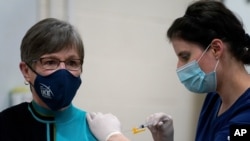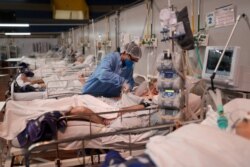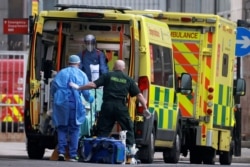There are 83.5 million global COVID-19 cases and 1.8 million deaths, the Johns Hopkins Coronavirus Resource Center reported Friday as the new year began.
The U.S. remains at the top of the list during the pandemic as the place with the most infections -- nearly 20 million -- and deaths – more than 345,000 -- from the coronavirus, Hopkins reported.
India has 10.2 million cases and more than 148,000 deaths, Hopkins said, while Brazil has 7.6 million infections with nearly 195,000 deaths.
Forty-two people in the U.S. state of West Virginia thought they had received a coronavirus vaccine, but instead they were injected with what The New York Times described as an “experimental monoclonal antibody treatment.”
The West Virginia National Guard said Thursday, “All individuals that received the antibody have been contacted or are in the process of being contacted.”
The National Guard said it does not believe that any of the people are “at any risk of harm.”
Major Gen. James Hoyer, adjutant general of the West Virginia National Guard, said in a statement, “The moment that we were notified of what happened, we acted right away to correct it, and we immediately reviewed and strengthened our protocols to enhance our distribution process to prevent this from happening again.”
The 42 individuals reportedly received the Regeneron antibody product instead of the Moderna vaccine.
“This product was the same one that was administered to [U.S.] President [Donald] Trump when he became infected,” said Dr. Clay Marsh, West Virginia’s COVID-19 czar, in a statement.
The West Virginia National Guard said the people who received the wrong treatment “will be offered the vaccine as soon as possible with a priority status.”
Flea markets and entertainment venues have been closed in seven of Thailand’s provinces, after 279 new coronavirus cases were reported Friday, according to the Associated Press. Restaurants will be allowed to only prepare take-out dishes.
The World Health Organization Thursday approved the Pfizer-BioNTech coronavirus vaccine for emergency use, a move aimed at helping the developing world gain access to the vaccine sooner.
The WHO set up its emergency use process to help countries without their own regulatory resources to approve vaccines, clearing the way for their use.
"This is a very positive step towards ensuring global access to COVID-19 vaccines,” said Mariangela Simao, the WHO's access to medicines program leader.
However, the super-cold temperature the vaccine must be kept at — minus 70 degrees Celsius — makes shipping and storing it a challenge for developing countries.
COVAX, a global effort backed by the WHO to buy and distribute vaccines to poorer countries, has commitments for 2 billion doses of vaccine so far and is in talks with Pfizer-BioNTech to buy some of its vaccine, which is 95% effective after two doses.
Another COVID-19 vaccine, this one developed by a Chinese drugmaker, on Thursday became the first to be granted official approval by China’s government.
China’s National Medical Products Administration announced the conditional approval of a vaccine developed by Beijing Biological Products Institute, a subsidiary of state-owned Sinopharm. The regulatory agency granted the approval a day after Sinopharm said the vaccine had an efficacy rate of 79.3% against the coronavirus in a final large-scale clinical trial.
However, outside experts have questioned Sinopharm’s claims because it has not provided necessary data for it to be independently verified.
The newly approved vaccine is one of five developed by Chinese companies that have been administered under its emergency use program while still undergoing phase 3 trials. More than 4.5 million doses have been administered since July to essential workers and people considered high risk, including 3 million since mid-December.
The Sinopharm vaccine joins other potential coronavirus vaccines to receive approval from governments around the world.
Britain’s medical regulatory agency announced Wednesday that it has granted emergency authorization of a coronavirus vaccine developed jointly by British-Swedish pharmaceutical giant AstraZeneca and Oxford University.
Late-stage clinical trials of the AstraZeneca-Oxford vaccine revealed it to be 70% effective against COVID-19. The vaccine had a 62% efficacy rate for participants given a full two doses, but tests of a smaller subgroup revealed it to be 90% effective when given a half-dose followed by a full dose weeks later.
The new vaccines are coming as a more contagious strain of COVID-19 first detected several days ago in Britain has been identified at various points on the globe.
A Brazilian lab said Thursday it has found two cases of the British variant, prompting researchers at its Tropical Medicine Institute to urge a redoubling of quarantine measures. Brazil has reported more than 55,000 new cases and nearly 1,200 deaths in the past 24 hours, according to Johns Hopkins University.
Officials in California on Wednesday announced the variant has surfaced in the southern city of San Diego. The Western state of Colorado was the first in the United States to report the new strain earlier this week.
A different variant of the coronavirus has been detected in South Africa.










